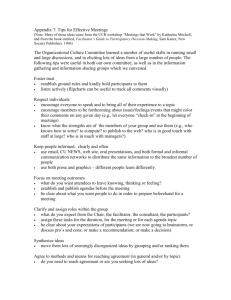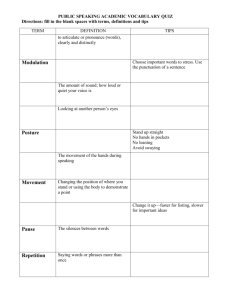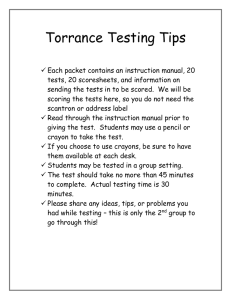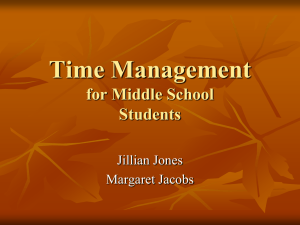Practical Tips for Effective Discussions The Connors Family Learning Center, Boston College
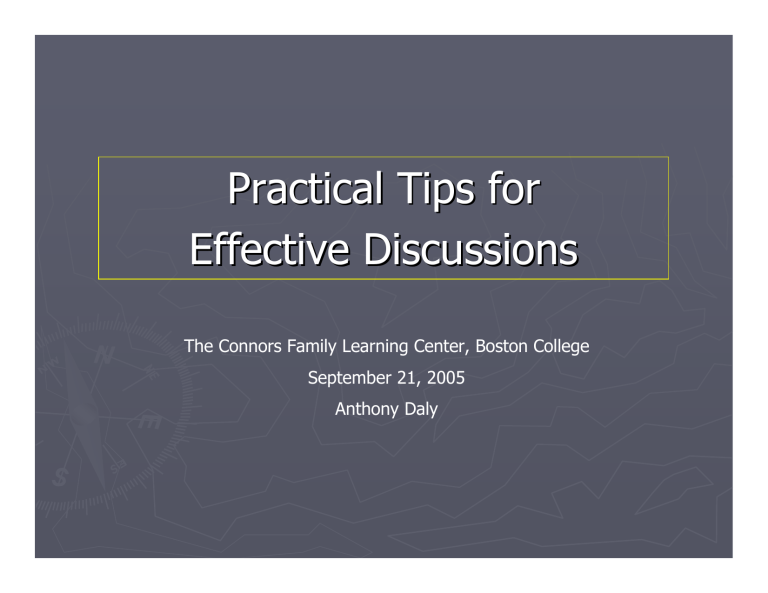
The Connors Family Learning Center, Boston College
September 21, 2005
Anthony Daly
Practical Tips for
Effective Discussions
Classroom discussions can be among the most rewarding teaching experiences, but also among the most complicated and challenging.
Today’s focus: concrete steps and tactics that can make any discussion better.
Practical Tips for
Effective Discussions
Other graduate students and faculty members — peers —
Also look at some of the excellent published sources…
Suggested resource:
Peter Filene, The Joy of Teaching: a practical guide for new college instructors (Chapel Hill, North
Carolina, 2005).
Practical Tips for
Effective Discussions
1. Preparing
2. Facilitating
3. Improving
Practical Tips for
Effective Discussions
1. Preparing
• Set goals
• Tweak material
• Student preparation
• Why it matters
• Signal main points
Practical Tips for
Effective Discussions
1. Preparing
• Set goals
In order for the class to be a success, you need to be clear what you are trying to accomplish.
For example, are you trying to convey core facts or simply start a conversation?
Practical Tips for
Effective Discussions
1. Preparing
• Tweak material
Is there too much material to be covered in the course reading? Is it too vague? Can you narrow it down, or make it more relevant?
Practical Tips for
Effective Discussions
1. Preparing
• Student preparation
Can you email the students in advance to point them towards key points for the discussion, or perhaps signal some of the questions you will use?
This can be especially helpful for shy students or those who like to think over their thoughts before volunteering to respond in class.
Practical Tips for
Effective Discussions
1. Preparing
• Why it matters
Explain why the discussion is an important part of the course. Be clear on how it figures into the grading scheme and what role material covered in discussion will play in exams and assignments.
Practical Tips for
Effective Discussions
1. Preparing
• Signal main points
At some point in the discussion, flag the key elements. This is helpful in showing students what material is more important, and provides a framework in what can be a wide-ranging discussion with many different opinions.
Practical Tips for
Effective Discussions
1. Preparing
• Set goals
• Tweak material
• Student preparation
• Why it matters
• Signal main points
Practical Tips for
Effective Discussions
2. Facilitating
• Rules and expectations
• Classroom dynamics
• Questions
• Start big
• Interesting parallels
Practical Tips for
Effective Discussions
2. Facilitating
• Rules and expectations
Tell the class what you are trying to accomplish in the class. Honesty can be a real asset. You are in this together with your students; everyone wants the discussion to be worthwhile and enjoyable.
Practical Tips for
Effective Discussions
2. Facilitating
• Classroom dynamics
Learn names to foster a good atmosphere and create a sense of community. Variables like seating arrangements can make a difference.
Practical Tips for
Effective Discussions
2. Facilitating
• Questions
Think about your phrasing. Try to start with openended questions that allow everyone to get involved with an opinion or something they noticed in the reading.
Save the harder, more specific questions until the ice is broken.
Practical Tips for
Effective Discussions
2. Facilitating
• Start big
Setting out the areas you will cover in the class— use the board, or an overhead—will allow you to let the discussion move freely without falling into what can appear to be chaos.
Practical Tips for
Effective Discussions
2. Facilitating
• Interesting parallels
Can you find ways to make the material seem topical and relevant? Any kind of related material— newspapers, web sites—can make a link that while exploring the same issues seems more “interesting” than the assigned reading.
Practical Tips for
Effective Discussions
2. Facilitating
• Rules and expectations
• Classroom dynamics
• Questions
• Start big
• Interesting parallels
Practical Tips for
Effective Discussions
3. Improving
• Feedback
• Small groups
• Switch things up
Practical Tips for
Effective Discussions
3. Improving
• Feedback
Have students give their thoughts on the class and provide suggestions. This can be individual and anonymous, or perhaps in small groups where they discuss the class and report back to the larger group.
Practical Tips for
Effective Discussions
3. Improving
• Small groups
Change the dynamic in the classroom by breaking up into small groups. Perhaps provide written topics or questions to focus conversation, while you float around the room.
Groups can discuss the same issues, or different ones and report back.
Use a short session at the end of the class to tie up the main points.
Practical Tips for
Effective Discussions
3. Improving
• Switch things up
There is almost no limit to the different ideas and strategies you can employ in a discussion. Debates can bring an issue alive; or, stage the trial of a controversial figure, where students play the roles of judge, lawyers, jury, etc.
Instead of a written description, an image or sound clip might be more effective, and trigger new directions in a discussion.
A painting can spark discussion on village life
Practical Tips for
Effective Discussions
3. Improving
• Feedback
• Small groups
• Switch things up
Practical Tips for
Effective Discussions
1. Preparing
2. Facilitating
3. Improving
The Connors Family Learning Center, Boston College
September 21, 2005
Anthony Daly

